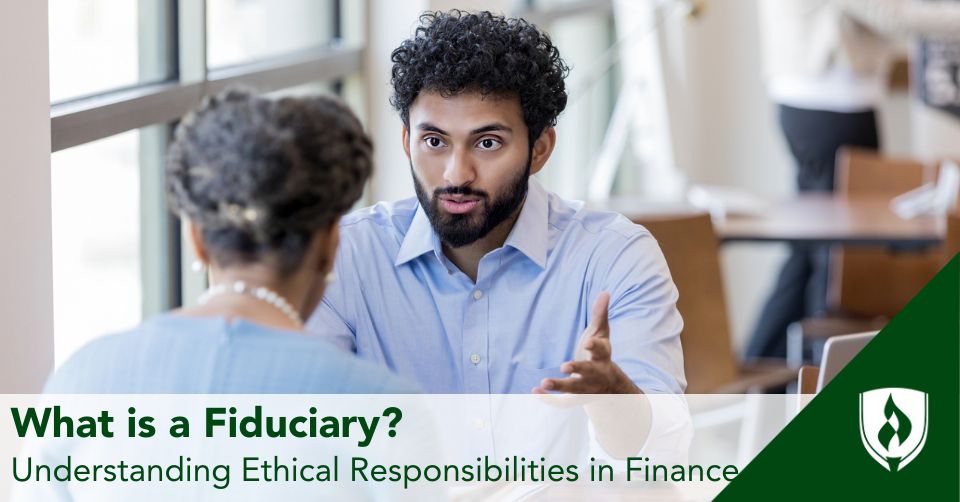What is a Fiduciary? Understanding Ethical Responsibilities in Finance
By Latricia Roundtree on 02/13/2025

Technically, a fiduciary is many things. It's not a job title, but it is a role.
The simple answer to 'what is a fiduciary?' is...a trustee: Someone entrusted with someone else's money, assets or property. But the real answer is far more complex. After all, you can probably think of a whole list of jobs where people manage someone else's assets.
Lawyers, trustees, money managers, many broker dealers and financial advisors all act as fiduciaries. Legal guardians, estate executor and company board members also have fiduciary relationships.
Basic fiduciary duties include making decisions that are in the best interest of another person or entity. This means, in part, that they have a legal duty of loyalty to an individual or organization (known as a beneficiary). They don't just give advice or assist--they're bound to take responsibility for the outcomes of their choices.
Fiduciary vs. financial advisor: Understanding the difference
If you come to a financial professional to get help with managing your money, that professional may or may not be bound to work in your best interest. Fiduciary duties are a state of legal obligation. Let's break that down for a second.
Let's say you go to a financial planner to get some advice on financial planning. This advisor will hopefully guide you into some good decisions, but they are not necessarily bound to your interests (legally) the way a fiduciary is. If you follow their advice into ruin, they aren't legally on the hook in any way.
Fiduciaries in the finance industry are usually certified financial advisors. They may also be called investment advisors. Since a fiduciary financial advisor is responsible for the assets of their clients, they are held to high standards when working on behalf of their clients’ accounts.
A certified financial planner and anyone who manages money in a formal capacity for someone else is likely a fiduciary. This means when managing someone else’s money, a fiduciary financial advisor must act in the financial interests of their clients and not undertake any actions that could be seen as self-interest.
How do fiduciary duties work?
You can't fully represent someone's best financial interests without knowing what their goals and preferences are.
When clients first hire registered investment advisors (RIAs) they complete an investment policy statement to formalize their fiduciary relationship. This document outlines a set of rules that hold both the financial advisor and client accountable. This policy statement also includes a list of restrictions that govern the way the financial planner manages the client’s assets.
Here are some things a client might include in their investment statement.
- Ethical standards
- Risk tolerance
- Types of companies they do and do not want to invest in
Detailing this contractual relationship helps the financial advisor understand their client's financial planning goals. Investment advisers act in accordance with this document as they choose potential investment products.
Fiduciary relationships exist in many other places as well
Most people are only aware of fiduciaries in relation to financial professionals, but there are many other roles that require fiduciary responsibilities. Even if you don’t plan to be a fiduciary, you still should be knowledgeable of fiduciary relationships in case you have to step into this role unexpectedly.
For example, let's say an elderly parent becomes ill and is unable to manage their own financial interests. When this happens, you would step in, as their fiduciary, to handle their finances and healthcare decisions.
At some point, you may become executor for their estate. This means you would act in a legal capacity to carry out their wishes as they instructed in their last will.
Another common way people take on fiduciary responsibilities is when they sponsor a retirement plan for their employees. Business owners have a legal duty to act in the best interest of their employees and handle all investment management in a way that avoids conflicts of interest.
A lot of people are not prepared for fiduciary responsibilities. It can be very stressful if they go into the situation without understanding fiduciary duties. These legal regulations dictate how to act in good faith on behalf of the person or persons you’re serving.
Legal consequences of breaching fiduciary duties
Fiduciaries are personally liable if they breach fiduciary duties and responsibilities. In some cases, these breaches result in civil or criminal charges. If someone in a fiduciary relationship mismanages money, has conflicts of interest with the beneficiary or is negligent in their fiduciary duties, they could find themselves with legitimate legal consequences.
Here's what it looks like if someone fails in their fiduciary duties
- Corporate officers: They could fail fiduciary duties if they embezzle or squander the organization’s funds.
- Investment advisors: They are liable for breaching fiduciary duties if they mismanage their client’s assets or give irresponsible investment advice.
- Legal guardians: They run afoul of fiduciary duties if they fail to act in good faith and in the best interest of their beneficiary.
- Business owners: They breach fiduciary duties if they do not manage their employees’ retirement fund assets appropriately.
The Securities and Exchange Commission could get involved
The Securities and Exchange Commission (SEC) is one of the governing bodies that enforces fiduciary rules. Under federal securities laws, the SEC is empowered to take enforcement actions such as removing or censuring a fiduciary, determining civil penalties or even initiating criminal proceedings.
Depending on the nature of the violation, the fiduciary may be responsible for compensatory damages.
Becoming a fiduciary for elderly parents
One of the most common scenarios of becoming a fiduciary is actually through your family. I personally experienced serving in a fiduciary capacity before my elderly parents passed away.
My mother always prepared me for this time, but of course, I was hesitant to talk about it with her because the thought of losing her was too difficult. When I was in high school, she showed me her file cabinet where she neatly organized all of her life insurance policies, bank account information and other important documents.
My mother was a bookkeeper for many years, so her organizational skills carried over into our home as well. And because of her skills, I never thought the day would come when she was not able to effectively manage her affairs.
In her later years, she started telling me about recurrent overdraft fees on her bank account. Most people might not find this strange, but I have never known my mom to overdraw her account. She was very strict about bookkeeping and was very organized, so I started to wonder what was going on.
I asked to view her bank statements/checkbook and noticed she had not been balancing her account like she usually did. When I was a little girl, I would sit and watch my mom balance her checking account down to the penny. I grew very concerned.
Fulfilling my fiduciary duties as a daughter
My mother was still in her sound mind and knew that she was starting to have trouble managing her finances. She asked me to go to the bank with her to be added to her account so I could help manage it.
Next, we completed a power of attorney document, which legally designated me as the fiduciary for her financial and medical decisions.
I knew this day would come. But still, I was not ready for it. I had an MBA with a concentration in finance, yet there was still a lot to learn. I wanted to ensure I was effectively handling my mother’s accounts and making the best possible decisions on her behalf. Certain fiduciary duties, like when you step in for a loved one, can feel even harder with all the emotions involved.
Preparing for my new fiduciary duties involved conducting a lot of research and getting help from elderly affairs professionals who understood how I could best meet each fiduciary standard.
I was thrust into this fiduciary capacity for my mother and then eventually my father as well a few years later. I followed each of the fiduciary responsibilities without even realizing I was doing so. I just know that I wanted to make sure I did right by my parents. I cared so deeply about their best interest, and that guided my choices.
I also didn’t want them to feel like their independence was being taken away from them.
Fiduciary duties and what they mean
There are specific parameters to your responsibilities in legal contexts. Fiduciary duty means honoring these directives. Here's what they are, along with some examples of how I fulfilled them on behalf of my parents.
1. Duty of care
Part of the fiduciary duty involves the duty of care. This means that you must exercise sound judgment to protect the other person’s interests.
My first priority was making sure I was doing everything I was supposed to do as their fiduciary. I called around and met with...
- Attorneys
- Nursing homes
- Case managers for hospitals
- Eldercare agencies
- Support groups for people with elderly parents
I also did lots of online research, reviewing state requirements and gaining referrals to eldercare professionals from friends and colleagues. It was an arduous task. You can’t find all of the information in one place, and everyone’s financial situation is different. But I kept asking and looking because I wanted to make the best decisions for my parents.
2. Duty of loyalty
You must keep the duty of loyalty in mind when undertaking fiduciary activities. This means understanding and prioritizing the beneficiary's financial interests and well-being.
For me to act in the best interest of my parents, I needed to put myself in their shoes. Honestly, it was a heartbreaking process because we grow up seeing our parents so strong and independent. Then as they age, we see them become more vulnerable and unable to handle everyday tasks.
I saw the sadness in my mother’s eyes when she went through this process. I assured her that I would always honor her wishes and that I was just there to help. I wanted to remain very respectful of her independence. I let her take the lead. I would only step in where needed. This was part of prioritizing her well-being as part of the duty of loyalty.
I remember when I had to complete the enrollment papers for her hospice care. The hospice nurse gave me some very useful advice. She said to always let my mother sign for herself unless she gets to a point where she was unable to. She said for the elderly, their independence is all they have left, and when they no longer have it, they start to lose hope.
The nurse’s advice inspired me to make sure my mother always signed her own paperwork when she had the capacity to do so. Also, when speaking with doctors, nurses and financial institutions, I would ask them to speak to my mother directly and ask her the questions that needed to be answered. I would only chime in when she deferred to me and asked me to step in to help.
Before taking on these fiduciary obligations, I didn’t realize how much our elderly population is overlooked.
I advocated for my parents and made sure they were seen and heard. I also empathized with so many other elderly people who had no one to advocate for them. Whenever I saw an elderly person needing help, I make an effort to advocate for them and get them the help they needed.
3. Duty of confidentiality
Another part of the process I was not prepared for was the record-keeping and organization involved. When you act as a fiduciary, it's crucial to keep all information about the beneficiary confidential and not to use it for your own benefit.
In addition to managing and organizing financial tasks for my own household, I was doing the same for both of my parents. This included account logins, contact numbers, appointments and documents. There was so much to keep track of! But because my mom kept everything organized, it made the process a little easier.
I also wanted to ensure I kept their documents confidential and separate from my household family documents. This required setting up a separate filing cabinet and online accounts. Although I would never use my parents’ finances for personal gain, I wanted to ensure everything remained separate and transparent.
4. Duty of good faith
Fiduciaries are legally required to take every measure to avoid breaking the law in the fulfillment of fiduciary obligations. At the beginning of this process, I knew I needed to learn the laws to ensure I did not inadvertently break any of them.
I used notebooks and spreadsheets to track transactions on behalf of my parents. I made sure to maintain all correspondence in their file cabinet. As you can imagine, I had a lot of mail/paper to file away. I still have a majority of the paperwork, although they have passed away.
Before becoming a fiduciary for my parents, I saw news stories of people getting in trouble for mismanaging the affairs of the elderly. I learned what I could do and what I could not do as a fiduciary.
We faced another layer of complexity when I eventually had to move my parents into a skilled nursing facility. They began receiving Medicare and Medicaid to help cover their medical expenses. When acting as a fiduciary in these instances, I needed to follow specific rules and federal laws.
Elder attorneys are very expensive, so I had to learn a lot on my own and reach out to many people for assistance as well. As always, the goal was to do what is in the best interest of my parents.
5. Duty of disclosure
As part of the fiduciary relationship, the fiduciary must disclose all information that could impact the beneficiary. Transparency was key for me when acting as the fiduciary for my parents. I told them about all transactions made from their accounts, and I kept them up to date with the bills that were being paid. I also answered any questions they had about their finances.
When I initially audited their accounts, I found several items that were paid for twice and old subscriptions that needed to be cancelled. For their financial transactions, I preferred to write a check instead of using cash. The checks provided more of a paper trail. Having a paper record helped me to document the reason for the transaction in the notes area of the check. I felt that taking this step provided more transparency.
Also, since my parents had Medicare and Medicaid, we faced annual audits to ensure I was fulfilling my fiduciary duties. Part of the audit included disclosing all of their bank statements and submitting them for review.
Honoring your responsibilities toward another person
Being a fiduciary is a huge ethical and legal responsibility. The beneficiary is placing their livelihood into your hands, whether you are a financial advisor, legal guardian, executor or a business owner.
You have to put aside any biases and opinions and act on behalf of the best interest of the beneficiary to whom you have a duty to protect. Not everyone has the natural capacity to do this and that’s okay.
But if you think you would enjoy acting as a fiduciary, even beyond your family, you might be the right kind of person for a role in finance. These positions are ideal for people with strong ethical standards and a great attention to detail.
Check out What Do Financial Advisors Do? A Closer Look at these Money Management Pros.




